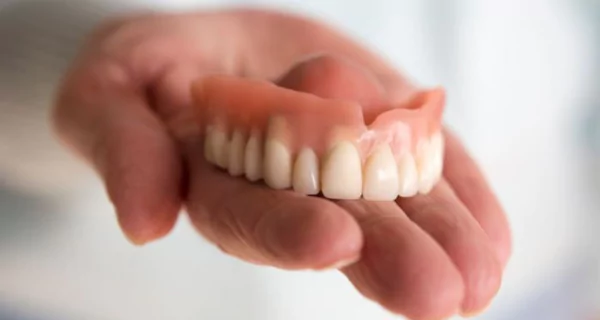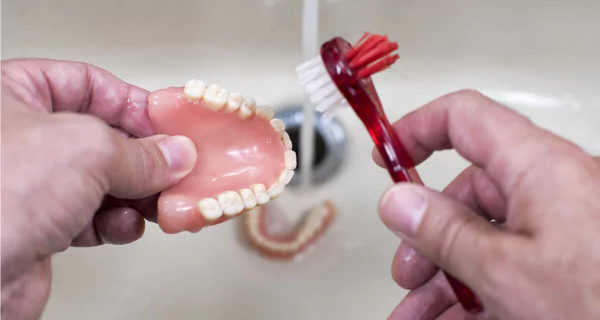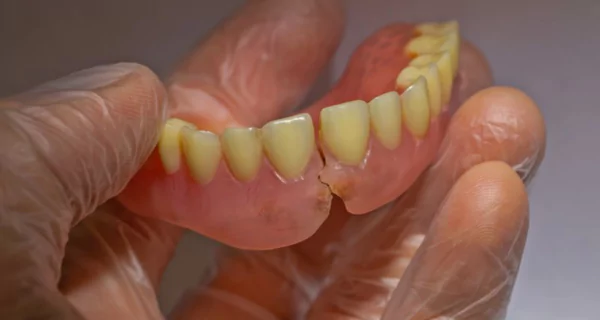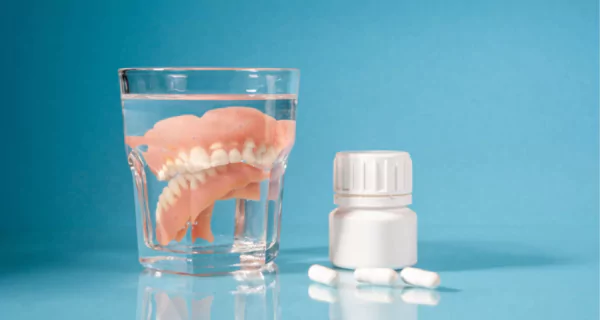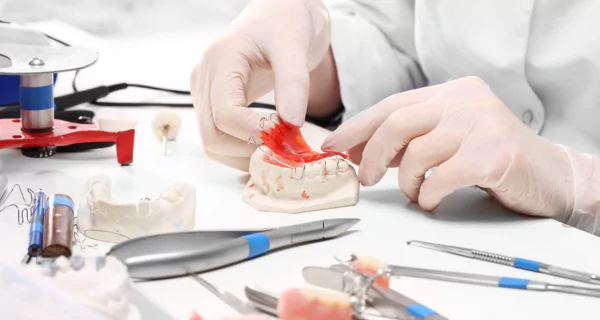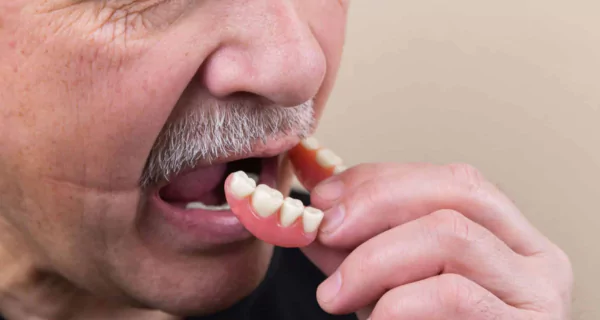Last Updated on: 3rd January 2026, 09:12 am
How Long Do Dentures Last? Key info you need
Find out how long dentures last and factors affecting their lifespan. Learn tips to make dentures last longer and recognize when to replace them.
Dentures are an essential solution for people who have lost their natural teeth, helping restore smiles, confidence, and chewing functionality. If you’re considering getting dentures or already have them, you might wonder: how long do dentures last? While no set answer fits everyone, understanding the factors that influence their lifespan can help you maximize their use and you will know when it’s time for a replacement.
What is the average lifespan of dentures?
On average, dentures last between 5 to 10 years. This range depends on factors like material quality, how well they fit, and how they’re maintained.
Dentures endure a lot, chewing, exposure to moisture, and occasional accidental drops. Over time, this wear and tear causes the materials to degrade. Even with proper care, they can lose their shape and fit as your mouth changes naturally.
Factors that affect denture lifespan
Material quality
Dentures are commonly made from acrylic resin or porcelain, each with its pros and cons:
- Acrylic dentures are a lightweight and cost-effective option for replacing missing teeth. They are easier to adjust, making them ideal for those who may need frequent modifications for a proper fit. However, they are more prone to wear and tear over time, which means they may require replacement sooner than other materials.
- Porcelain dentures are known for their durability and stain resistance, offering a natural and long-lasting appearance. While they are heavier and more expensive than acrylic options, their strength makes them a reliable choice for many. However, porcelain dentures are more brittle and at a greater risk of breaking if accidentally dropped.
How long dentures last depends on choosing high-quality materials, which can significantly extend their longevity.
Frequency of use
Daily wear naturally stresses dentures. Wearing them while sleeping, for instance, increases the risk of material degradation and gum irritation. Removing dentures at night allows your oral tissues to rest and helps preserve their condition.
Maintenance and care
Proper care is critical for extending the lifespan of dentures.
- Clean them daily with a soft brush and non-abrasive cleaner.
- Handle them carefully to avoid accidental drops.
- Store them in water or a denture-soaking solution when not in use to prevent drying or warping.
- Attend regular dental checkups for adjustments and maintenance.
Fit and comfort
Over time, changes in your gums and jaw can cause dentures to loosen, leading to discomfort and functional issues. Regular adjustments by your dentist can maintain a proper fit and prevent damage caused by poorly fitting dentures.
When should you replace your dentures?
Knowing when to replace your dentures is essential for maintaining your oral health and overall comfort. Here are common signs that indicate it may be time for a new set:
- Visible damage: Cracks, chips, or worn-down teeth suggest that the materials have deteriorated.
- Loose fit: If your dentures frequently slip out of place or feel uncomfortable, they may need replacing or refitting.
- Changes in facial structure: Shrinking gums and jawbones can alter the fit of your dentures, leading to misalignment, discomfort, or difficulty chewing.
- Persistent odor or stains: If regular cleaning doesn’t eliminate stains or odors, it may indicate that the materials are breaking down.
Tips to make your dentures last longer
While dentures eventually need replacement, proper care and maintenance can significantly extend their lifespan and keep them functional and comfortable. Here are essential tips to help your dentures last as long as possible:
- Daily cleaning routine
Rinse your dentures with water after meals to remove food particles.
Clean them daily using a soft-bristle toothbrush and a non-abrasive cleaner designed specifically for dentures. Avoid regular toothpaste, as it can be too harsh and damage the materials.
Clean your dentures thoroughly before going to bed each night to maintain hygiene and prevent buildup.
- Handle with care
Always handle your dentures over a soft surface, such as a towel or a basin filled with water, to prevent breakage if dropped.
When not in use, keep your dentures moist by storing them in water or a denture-soaking solution. This prevents drying out or warping of the materials.
- Regular dental visits
Schedule annual checkups with your dentist to assess the fit and condition of your dentures. Dentists can reline (reshape the underside) or rebase (replace the base materials) of your dentures as needed to maintain a proper fit.
If you experience gum irritation, discomfort, or any signs of damage, contact your dentist immediately for an evaluation.
- Remove them at night
Take your dentures out before sleeping to give your gums and oral tissues a chance to rest and recover. This also helps prevent irritation and promotes overall oral health.
- Protect against damage
Avoid using harsh cleaners, hot water, or abrasive materials, as these can weaken or distort the dentures.
Handle them gently to prevent cracks, chips, or other damage.
- Proper storage
Storing your dentures correctly is essential to maintain their shape, fit, and cleanliness. Follow these simple steps to keep them in optimal condition when not in use:
Keep them moist: Dentures should always stay moist to prevent warping or cracking. Store them in plain water or a denture-soaking solution. Avoid using hot water, as it can distort the material.
Use a clean storage container: Place your dentures in a clean, sealed container to protect them from dust and bacteria. Regularly sanitize the container to prevent contamination.
Travel tips: When traveling, use a portable denture case with a secure lid, and bring a small bottle of denture cleaning solution to maintain their freshness on the go.
By following these practices and addressing any issues promptly with your dentist, you can influence how long dentures last, maximizing their functionality, appearance, and comfort to ensure they serve you well for as long as possible.
What are the risks of using old dentures?
Using old, worn-out dentures isn’t just uncomfortable, it can also harm your oral health.
- Increased risk of infections: Bacteria can accumulate in cracked or porous dentures, leading to gum infections or bad breath.
- Gum irritation: Poorly fitting dentures can cause sores, inflammation, or ulcers on your gums.
- Misaligned bite: Old dentures may not align correctly, putting strain on your jaw and leading to pain or difficulty chewing.
Replacing dentures when necessary ensures your mouth stays healthy and functional.
Can dentures be repaired or relined?
Minor damage or changes in fit don’t always mean you need a full denture replacement. Depending on the issue, repairs or relining can restore your dentures’ comfort and functionality.
Denture repairs
- When repairs are possible: Cracks, chips, or broken teeth in your dentures can often be fixed by a dentist. Repairs restore both appearance and usability without requiring a full replacement.
- Professional vs. DIY: While over-the-counter denture repair kits are available, it’s safer and more reliable to have repairs done professionally. DIY fixes may provide temporary solutions but can compromise the durability and safety of your dentures.
Denture relining
Relining adds new material to the inner surface of your dentures to improve their fit. This is often necessary when:
- Gum changes: Over time, your gums may shrink or change shape, causing dentures to feel loose.
- Uncomfortable fit: If your dentures are still intact but don’t fit well, relining can restore their comfort without replacing the entire set.
When replacement is necessary
In cases where the structure or base of the dentures is severely compromised, such as extensive cracks, warping, or persistent discomfort, repairs or relining may not be sufficient. Full replacement is the safest and most effective solution to ensure proper function and oral health.
For those looking for an alternative, implant-supported dentures are another option, they are anchored by dental implants, offering enhanced stability and durability. They mimic the feel and function of natural teeth, making them a more secure option. However, they require surgery, are more expensive, and need healthy gums and sufficient jawbone for successful placement.
Conclusion
Dentures are a reliable solution for replacing missing teeth, but like anything else, they don’t last forever. How long dentures do last depends on factors such as daily wear, maintenance habits, and changes in your gums and jaw, all of which can affect their longevity. Practicing good care, like regular cleaning, proper storage, and avoiding accidental damage, can help extend their lifespan and maintain their functionality.
Any type of denture needs regular checkups with your dentist. It remains the best way to monitor their condition and ensure your smile stays healthy and confident for years to come!
Frequently Asked Questions
How can I extend the life of my dentures?
What happens if I don't replace worn-out dentures?
Can dentures last longer than 10 years?
Are there alternatives to traditional dentures?
Can I sleep with my dentures on?
Share
References
1. Caputi, S., Murmura, G., Ricci, L., Varvara, G., & Sinjari, B. (2014, february 4). Immediate denture fabrication: a clinical report. Annali di stomatologia, 4(3-4), 273–277. https://pmc.ncbi.nlm.nih.gov/articles/PMC3935354/
2. Cleveland clinic staff. (2024, may 1). Dentures. Cleveland Clinic. https://my.clevelandclinic.org/health/treatments/10900-dentures
3. Gotter, A. (2018, March 28). False teeth: What you should know. Healthline. https://www.healthline.com/health/false-teeth
4. Jar, A., Khormi, A., Al-Khamiss, N. A., Alnaim, A., Alharbi, Z. F., Holba, H. A., Alshamrani, A. S., Khormi, A., Alharbi, A. S., Almutairi, A. M., & Alhegbani, F. A. (2023, december). The effect of dentures on oral health and the quality of life. International Journal Of Community Medicine And Public Health, 10(12), 5067-5071. https://doi.org/10.18203/2394-6040.ijcmph20233524
5. WebMD staff. (2023, 5 september). Dental Health and Dentures. WebMD. https://www.webmd.com/oral-health/dental-health-dentures
-
Nayibe Cubillos M. [Author]
Pharmaceutical Chemestry |Pharmaceutical Process Management | Pharmaceutical Care | Pharmaceutical Services Audit | Pharmaceutical Services Process Consulting | Content Project Manager | SEO Knowledge | Content Writer | Leadership | Scrum Master
View all posts
A healthcare writer with a solid background in pharmaceutical chemistry and a thorough understanding of Colombian regulatory processes and comprehensive sector management, she has significant experience coordinating and leading multidisciplina...


